Key takeaways:
- Understanding and analyzing various types of fees, such as service, annual, and maintenance fees, is essential for better financial management and reducing unnecessary expenses.
- Negotiating fees can lead to significant savings; proactive communication with service providers can yield discounts and waivers for fees that seem non-negotiable.
- Keeping a detailed expense journal helps identify recurring hidden fees, fostering a more intentional approach to budgeting and spending.
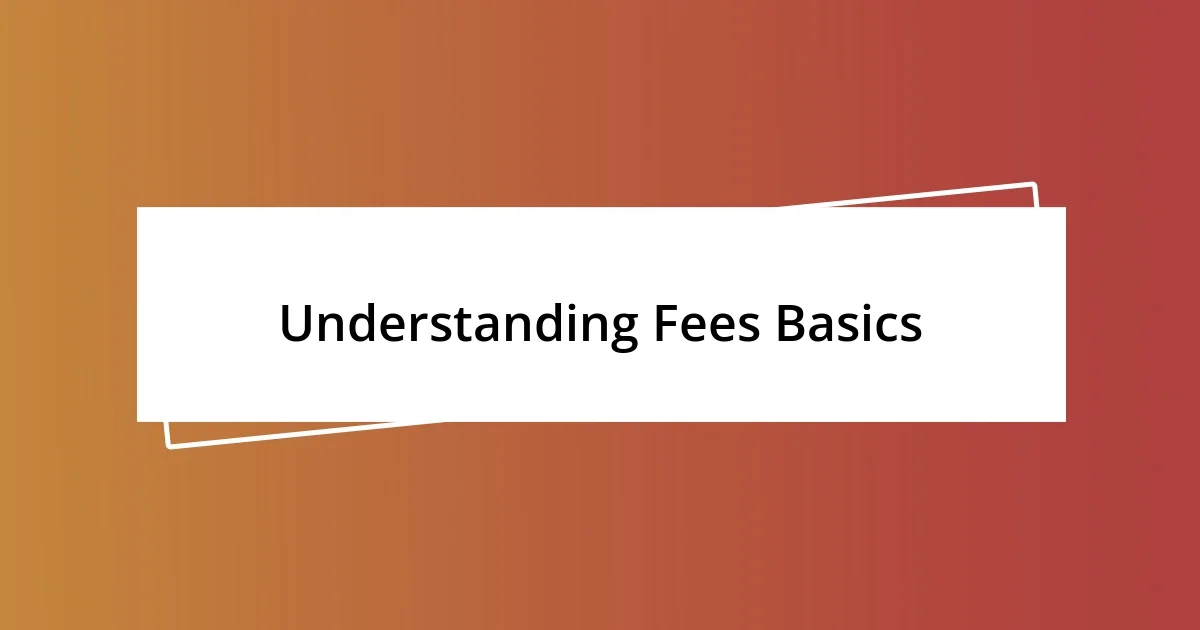
Understanding Fees Basics
Understanding fees can sometimes feel like navigating a maze—there are so many different types involved. When I first looked at my bank statement, I was overwhelmed by all those tiny charges. Why were they there? Did I really need to pay these fees, or were they just hidden costs that could be avoided with a bit of knowledge?
One of the most surprising things I learned is how prevalent service fees are, especially in everyday transactions. For instance, when I booked a flight, I felt a sharp sting when I saw the additional fees stacking up—everything from checked luggage to seat selection. It made me wonder, how could such seemingly trivial things add so much to the final price? This realization taught me the importance of reading the fine print; those little details can make a significant difference.
I’ve also come to appreciate the variety of fees that can come into play in different contexts, like annual fees for credit cards or maintenance fees for bank accounts. At first, I was carelessly racking up charges, thinking they were just a part of life’s expenses. Then it hit me—these fees didn’t have to be a constant companion on my financial journey. I began to analyze which fees were necessary and which ones I could easily sidestep, fostering a sense of empowerment over my finances.
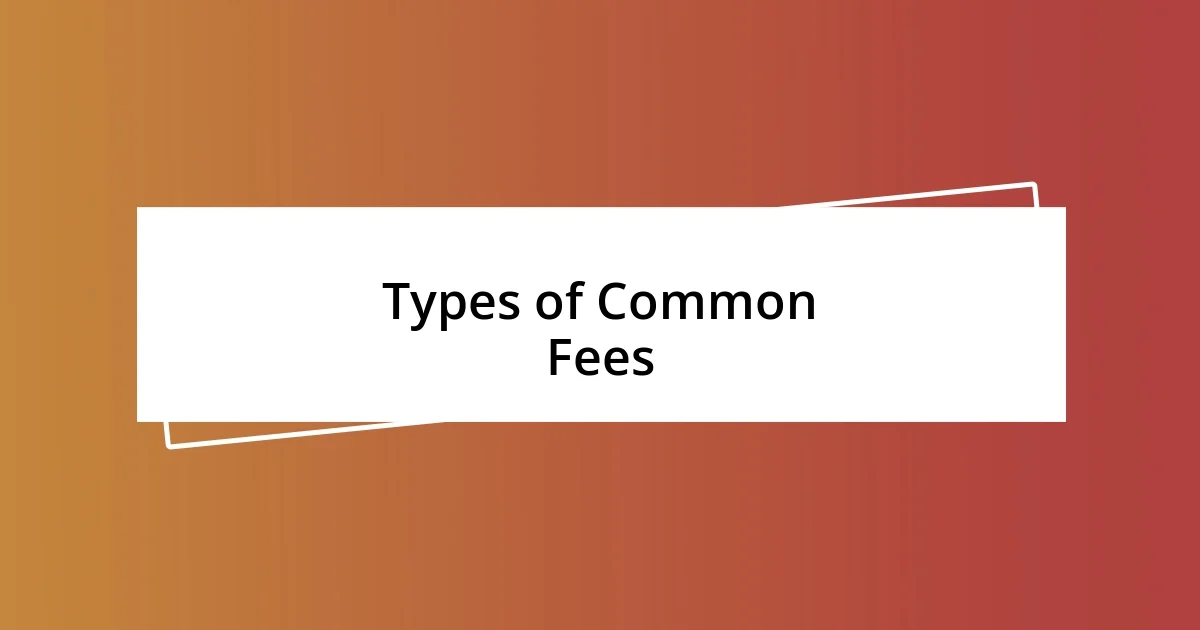
Types of Common Fees
When I started understanding fees, I was shocked by how many types were out there. It felt like every service had its own secret pricing structure. Here are some common fees I learned about along the way:
- Service Fees: Charges for using a service, like booking a flight or making a reservation.
- Annual Fees: Yearly costs for maintaining a credit card or membership.
- Maintenance Fees: Monthly charges for keeping a bank account active.
- Transaction Fees: Costs associated with purchases, often seen in foreign transactions.
- Late Payment Fees: Penalties for not paying bills on time, which can add up quickly.
One of my earlier experiences with fees still resonates with me. I mistakenly overlooked the monthly maintenance fee on my bank account, thinking it was too small to matter. When I finally noticed it accumulating, it felt like a punch in the gut. These little things can slip through the cracks, but they can affect your budget more than you’d think. Recognizing these fees helped me develop a more intentional approach to my spending.
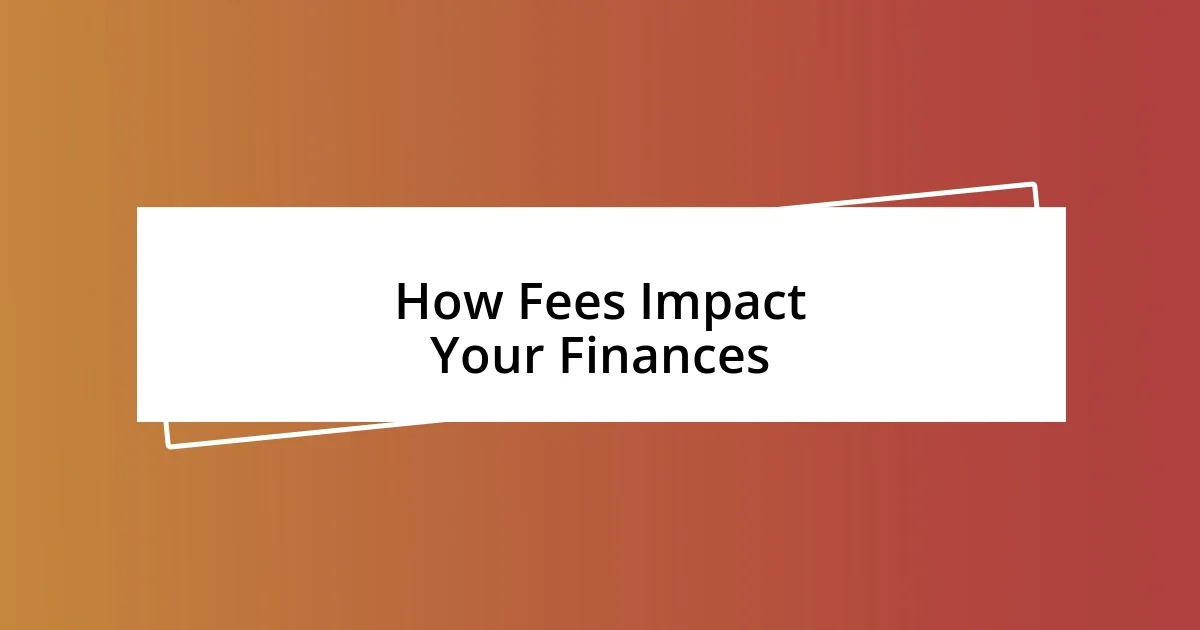
How Fees Impact Your Finances
When I started tracking my expenses closely, I was struck by how quickly fees could erode my savings. Just last month, I encountered an unexpected overdraft fee that pushed me over my budget. It felt like a tiny anchor pulling my finances down when I was trying to lift them up. This experience reminded me that even small fees can ripple through my financial health, creating unforeseen challenges.
I’ve learned that fees aren’t just isolated charges; they often accumulate and compound over time, which can lead to a much larger financial impact. For example, I once ignored a late payment fee, thinking it was just a one-time issue. But that one fee led me to miss out on a promotional interest rate on my credit card, which hurt my overall financial plan. Isn’t it interesting how one oversight can snowball into a situation that stifles your financial goals?
Here is a comparison of different types of fees and how they can accumulate over time, impacting your overall financial situation:
| Type of Fee | Potential Annual Cost |
|---|---|
| Service Fees | $150 |
| Annual Fees | $95 |
| Maintenance Fees | $120 |
| Transaction Fees | $200 |
| Late Payment Fees | $300 |

Analyzing Hidden Fees
When I first dove into understanding hidden fees, I was surprised by how often they crept into transactions without a hint of warning. I remember being excited about a new subscription, only to discover a “processing fee” that wasn’t clearly outlined until after I had signed up. Have you ever felt that sinking feeling when unexpected costs pop up out of nowhere? It can really make you question whether you’re getting a fair deal.
One experience that stands out is when I rented a car for a weekend getaway. Initially, the rate looked great, but the return process revealed a flurry of hidden fees, including insurance and additional charges for not refueling. I felt misled and frustrated as the final bill was nearly double what I had budgeted. This taught me the importance of scrutinizing each component of a deal—what might seem like an attractive offer can easily turn into a budget-buster.
Now, I always ask specific questions and read the fine print before committing to anything. I’ve learned that being proactive allows me to avoid nasty surprises. How often do we assume transparency? In my experience, taking the time to analyze potential hidden fees has saved me from unnecessary stress and financial strain. I approach each financial decision with a critical eye, and it has made a real difference in how I manage my money.
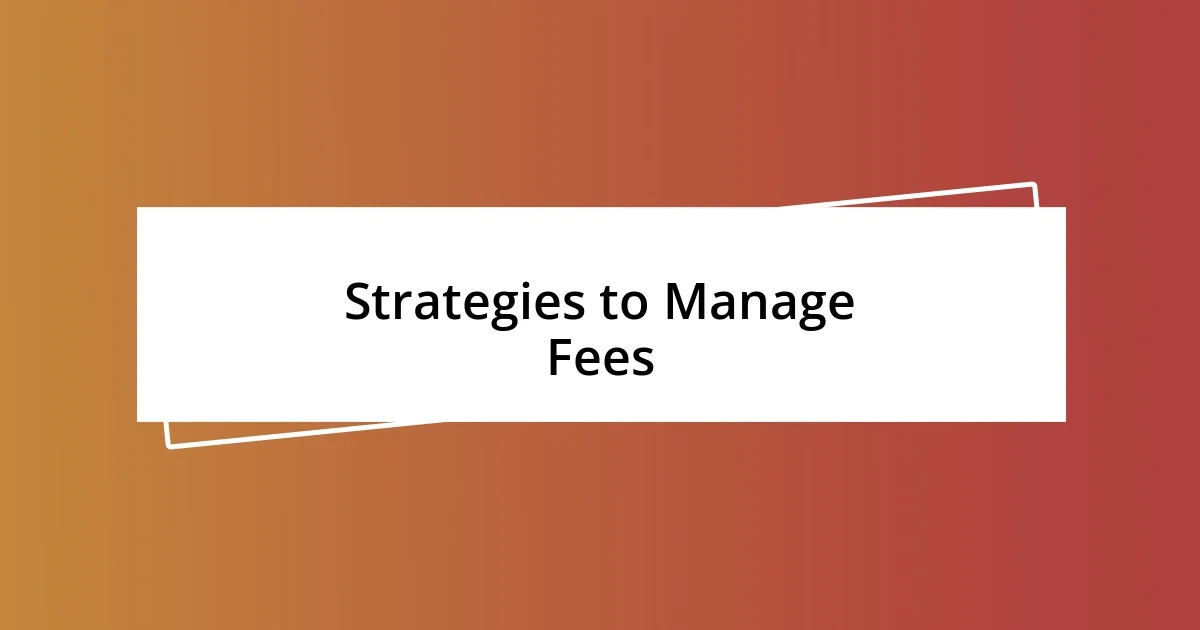
Strategies to Manage Fees
Finding ways to manage fees has been a game-changer for me. When I realized how much those little charges added up, I decided to set up alerts for my accounts—especially for due dates and balance thresholds. I remember the relief I felt when I avoided a late payment fee simply because my phone reminded me in time. Have you ever had that moment of panic when you check your balance too late?
Creating a budget that includes all potential fees has significantly eased my financial stress. For instance, I started allocating a small amount each month to cover my annual fees and service charges. This proactive strategy means I no longer have to scramble to find funds when those charges hit. It’s like a buffer zone, allowing me to stick to my financial goals without unexpected detours. Have you ever thought about budgeting for your fees rather than letting them surprise you?
One trick I’ve embraced is negotiating fees whenever possible. I once called my bank to ask about waiving a monthly maintenance fee, and to my surprise, they agreed—thanks to my long-standing relationship with them. This experience taught me that it’s worth asking questions and advocating for myself. Why not leverage your position as a customer? In my journey, I’ve discovered that engaging with service providers can lead to surprising outcomes, often putting more money back in my pocket.
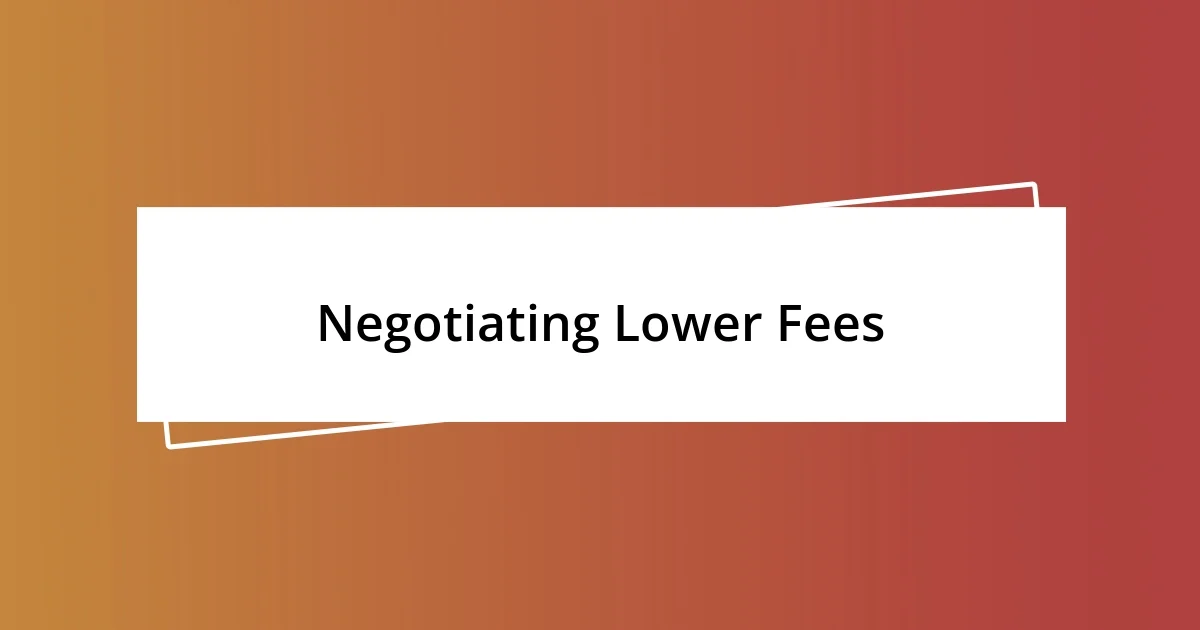
Negotiating Lower Fees
Negotiating fees might seem daunting at first, but I’ve found it to be surprisingly rewarding. I recall an instance when I was faced with a hefty annual fee for a service I barely used. Instead of accepting it, I decided to pick up the phone and ask if there was any chance they could lower it. I felt a mix of nerves and determination, but in the end, they offered me a discount just because I asked. Doesn’t it make you wonder how many fees you could be negotiating simply by speaking up?
Another memorable moment occurred when I was about to sign a contract with a new internet provider. I had done my research and discovered that competitors were offering lower rates. With that in my back pocket, I confidently approached the representative, highlighting my findings. I must admit, my heart raced a bit while I negotiated. But surprisingly, they matched the competitor’s rate without any hesitation. It felt like a small victory that not only made my wallet happier but also empowered me. Have you ever stood your ground during negotiations? It can really change the game.
One practice I’ve adopted is to always store detailed notes of my past negotiations, including what worked and what didn’t. For example, I once successfully argued against a service charge that had appeared unexpectedly on my bill. By referencing the conversation I’d had earlier with a representative, I created a solid case that they couldn’t ignore. It demonstrated the importance of being persistent and organized. In my experience, preparation can really set the stage for successful negotiations. Have you kept track of your negotiation outcomes? You might be surprised by the insights you uncover!

Learning from My Experiences
I’ve learned that every little fee adds up, which came as a surprise to me during my college years. I once overlooked a minor monthly subscription fee, thinking it was insignificant, only to realize it had become a major drain over the course of the semester. That experience taught me the importance of scrutinizing all my monthly expenses. Have you ever had a similar realization about a hidden fee lurking in your budget?
One of the most eye-opening moments came when I started keeping a detailed expense journal. As I flipped through the pages, I noticed patterns; certain fees popped up again and again, often for services I didn’t even use. This made me reconsider what exactly I was paying for. It was like uncovering a treasure map just to realize where I was wasting my money. Have you ever taken a step back to really evaluate where your money goes? The clarity it brings is truly invaluable.
Reflecting on my past experiences, I’ve come to appreciate the importance of asking for clarity. There was a time when I hesitated to question the fees on my credit card statement, convinced it would be too complicated. But one day, I mustered the courage to call customer service, and I was pleasantly surprised to have my questions answered in a straightforward manner. That interaction opened my eyes to how often we overthink things. Have you ever found that simply asking can lead to a greater understanding? It’s empowering to recognize that knowledge is often just one question away.














